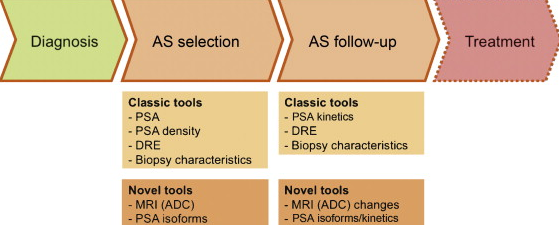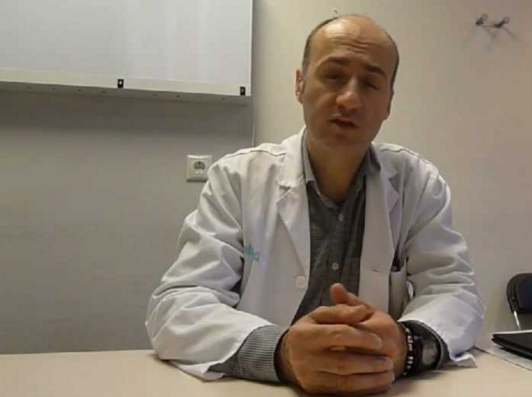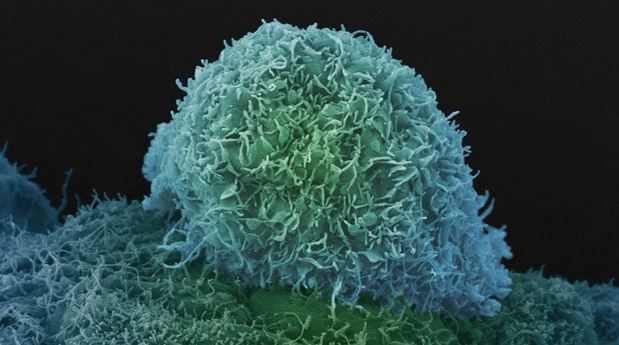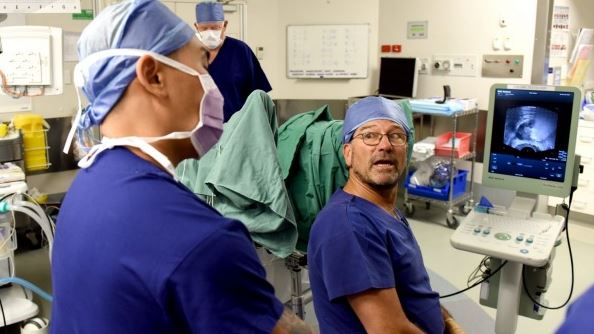|
In this article researchers are trying to find out what your chances of dying from prostate cancer are so that you can make a better choice on treatment. A radical prostatectomy could be avoided by some.....
Researchers at the University of Copenhagen have identified a new prognostic biomarker: the neuropeptide pro-NPY, which may help determine the risk of dying from prostate cancer. This particular type of protein is very specific to prostate cancer cells and could help identify whether newly diagnosed patients require radical prostatectomy surgery or if it is safe to delay surgery. Using mass spectrometry, the researchers measured concentration changes in thousands of proteins in both normal and tumour tissue from prostate cancer. They discovered that in comparison to normal tissue, the prostate tumors exhibit numerous metabolic alterations including exacerbated activity of mitochondria. Read More
2 Comments
In this study men with lower risk prostate cancer were found to benefit from waiting and watching. I would imagine that would be Gleason 6 and lower. I would love to see a study on Gleason 7 patients as that is a more difficult decision.
Is active surveillance a trustworthy and viable method to manage prostate cancer in a variety of practice settings — that is, outside the small group of academic centers that have pioneered and proven the approach in North America? The answer appears to be yes — in the short run at least, according to findings from a nine-site cohort study that includes a Veterans Administration (VA) hospital and a community-based practice. "Active surveillance is safe and a good initial strategy. About 10% to 15% of men fall off each year and transition to treatment," summarized investigator Daniel Lin, MD, a urologist at the University of Washington and Veterans Affairs Puget Sound Health Care System in Seattle. Read More Despite all the media controversy about PSA tests we all know that prostate cancer can be cured if caught early enough. The challenge for most men is that early prostate cancer has no symptoms but the side effects can seem severe enough to consider postponement of treatment. A graph of survival rates of patients given treatment compared with those who do not have it shows little difference in the first four years but after that, the survival rates for treated patients grows exponentially higher. If you are faced with this diagnosis give us a call at Prostate Cancer Burnaby Support Group Read more This is a very important article for those of us who have to make tough decisions very early on. This is often the case with early screening. Diagnosed with prostate cancer, we often leave the doctors office totally bewildered with a stack of flyers and a recommendation for treatment. "In the end it's your choice" we are told. We look at our PSA and Gleason scores as well as the potential side-effects of different treatment options. This PubMed article concludes that there are consistently higher mortality for patients treated with radiotherapy rather than surgery. Read the article here Scientists in France have found that fat cells may play a key role in how prostate cancer cells move. A team at the University of Toulouse found that, in mice, fat cells surrounding the prostate release a protein called CCL7, which sticks to a molecule on the surface of prostate cancer cells called CCR3. “The next step is to assess if this approach could benefit men with the disease.” - Dr Áine McCarthy, Cancer Research UK This interaction was able to help the cancerous cells move and spread in the mice, according to the study published in Nature Communications. By looking at tissue samples from men with prostate cancer, they also showed that higher levels of the CCR3 molecule were more common in more aggressive forms of the disease. And in tissue samples with higher levels of CCR3, the cancer cells were seen to move outside the prostate gland to the surrounding fat tissue. “This research in mice sheds light on why obese men with prostate cancer are more likely to have aggressive tumours,” said Dr Áine McCarthy, science information officer at Cancer Research UK. “It shows for the first time how fat cells surrounding the prostate use chemical signals to talk to tumour cells, enticing them to move and spread around the body. Excitingly, the researchers proved that jamming communications between fat cells and tumour cells stopped the cancer spreading. “The next step is to assess if this approach, using drugs that are already being developed, could benefit men with the disease,” she added. Read More "The electricity is so powerful they have to be paralysed while we're doing it or they would just jump off the table."
This was St Vincent's Private Hospital urologist Phillip Stricker, speaking of an emerging treatment for prostate cancer that involves zapping the tumour with more electricity than a bolt of lightning. Patient Rob Gunn, 65, was unconscious on the operating table, legs aloft, with four needles framing the site of the cancer. When the doctors switched on the machine, his legs began to jerk. Over the next 10 minutes, 90 pulses of electricity passed between the needles, exposing each centimetre of tissue to up to 1500 volts. By the end, the lesion had completely disappeared. "You can't underestimate the potential of this technology," Professor Stricker said. "It's going to save a lot of people from having unnecessary surgery." Read More It is the time of the year when no one can escape the traditional slew of diet and healthy lifestyle advice. Now any man seeking to shed the Christmas pounds may have an extra reason to get on that treadmill as a new study will examine how exercise affects prostate cancer survival. A group of men already suffering from the illness will undergo weekly aerobic sessions by researchers to explore the possible health benefits. Backed by Cancer Research UK, it is hoped the year-long study will lead to a full trial, thought to be the first of its kind. Read More Add another disease to the list of ailments that may be thwarted by regular aspirin use—prostate cancer.
Researchers reported that men who took at least three aspirin tablets a week reduced their risk of developing or dying from advanced prostate cancer. The aspirin didn’t affect whether the men developed the disease to begin with, though. Separately, other scientists found what they described as early evidence that a government panel’s recommendation against routine prostate-cancer screening may be having an unwelcome result: an increase in detection of tumors at more advanced states, when they are harder to treat. Findings from the two studies were released Monday ahead of their presentation at the American Society of Clinical Oncology Genitourinary Cancers Symposium in San Francisco later this week. Read More Len Gross had his life changed in 1992 when he had prostate surgery that left him permanently impotent. Gross would have every reason to have regrets given that his cancer was so minimal that doctors would not even operate on him today. He is is now a founding and board member of the Prostate Cancer Foundation of BC and one of the founders of the Canadian Prostate Cancer Network. Now at 81 years old he still takes part in the annual Father’s Day walk/run around Burnaby Lake to raise funds for prostate cancer research and support. The walk/run has raised more than 2 million dollars. Gross said helping other men with prostate cancer has helped him see the bright side of his own situation. Our 17th Annual Father's Day Walk/Run is being held at Burnaby Lake on June 19, 2013.This year’s theme is “show your blue” where participants are encouraged to come dressed in blue for a costume contest that is new this year. Organizers will have a “blue tent” for those needing costumes or accessories. This event attracts people of all ages and is for serious runners, casual walkers and families. This is a celebration with a BBQ lunch, prizes and entertainment. REGISTER ONLINE to participate, sponsor a participant, or volunteer for this event. Read More  Some good news men! This article shows some evidence that daily orgasms can reduce the risk of prostate cancer. One out of seven men will get prostate cancer. Unfortunately, most of the risk factors have to do with age, race, and family history, so they are not modifiable. But new research suggests that daily orgasms will reduce the risk of prostate cancer by over 20 percent. The study data showed that the participants who ejaculated more than 21 times a month were at a 22 per cent lower risk of getting the disease. As for how men achieved ejaculation, it is not a requirement to have a sex partner. Whether it be sexual intercourse, nocturnal emission, or masturbation, all are beneficial. Read more here |
AuthorThis blog is put together by a member of the Prostate Cancer Burnaby Support Group. Archives
July 2016
Categories |









 RSS Feed
RSS Feed